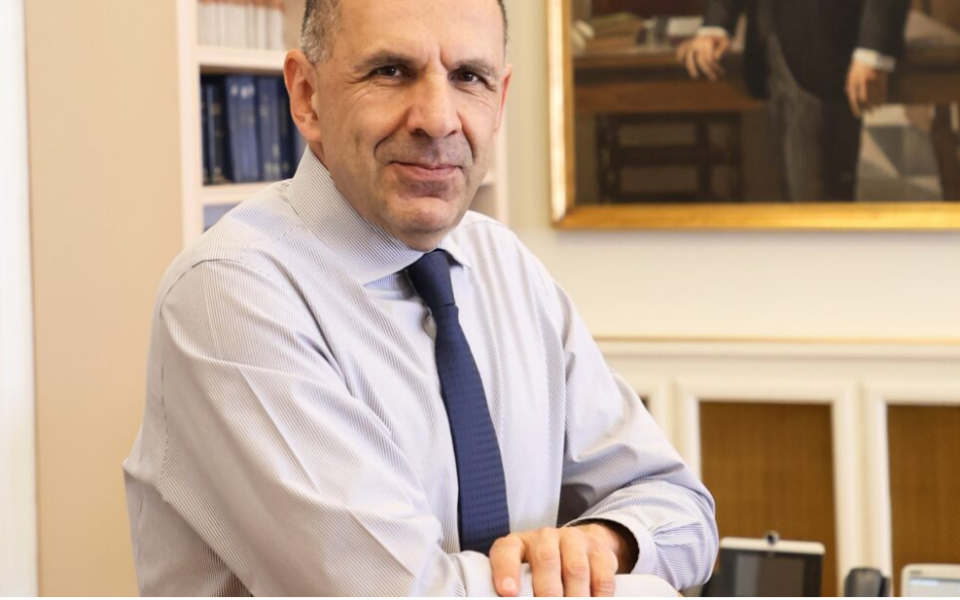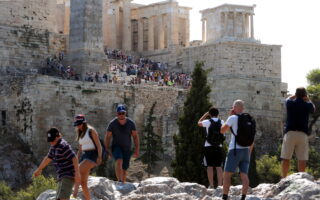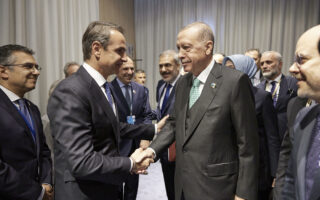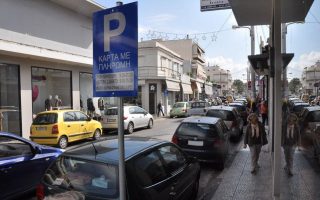‘Let’s face the future challenges squarely’

“With a strong political mandate and with our important international capital, I think the time has come to face squarely the wounds of the past and the challenges of the future,” says Giorgos Gerapetritis in the first exclusive interview he has given as foreign minister.
A few days have passed since the meeting between Prime Minister Kyriakos Mitsotakis and President Recep Tayyip Erdogan in Vilnius, which could lead to a rapprochement between Greece and Turkey. Gerapetritis talks about the need to adopt a bold agenda as a legacy for future generations, while referring to the contacts he will have with his Turkish counterpart Hakan Fidan, as well as the possibility of a new Mitsotakis-Erdogan meeting in New York in September.
How did you feel when the prime minister told you you would take over the Ministry of Foreign Affairs? How do you plan to work as a minister?
I fully realize the importance and the stakes involved in leading a ministry intertwined with the very existence, history and international image of the country. I felt honored and I felt that I assumed a great responsibility. Our country does not have a dependent foreign policy; it has achieved self-confidence and international recognition by developing all of the Greek community’s sources of power across the world. My objective will be to enhance a proactive approach and public diplomacy and building a multifaceted foreign policy. My intention is to work so that Greeks feel proud and protected. I genuinely feel that I am accountable to all Greek citizens and to the generations to come.
You took part in perhaps the most consequential meeting between the leaders of Greece and Turkey in the last four years. Do you think the current calm atmosphere in the Aegean will continue?
The meeting of the Greek prime minister with the Turkish president in Vilnius took place in an atmosphere of desire for mutual understanding. We are starting a dialogue with good intentions and we want this new effort to be marked by honesty and trust. A first step has been taken. The calmness that currently prevails in the Aegean is a necessary precondition for this new beginning to be fruitful. But it will take time and consistency to arrive at a prospect of true friendship, peace and cooperation.
Is President Erdogan in the process of genuinely normalizing his relations with the West, or is this a fluke?
I cannot speak about what determines the Turkish president’s approach. The Greek government desires a climate of cooperation and dialogue. I personally look forward to building a reliable and stable relationship with my Turkish counterpart, with whom I have already taken the first steps toward a direct channel of communication. Regarding Turkey’s relations with the West and specifically with the European Union, Greece’s position is known and consistent: Progress in Euro-Turkish relations would contribute to stability in an extremely fragile region. But also vice versa, progress in the normalization of Greece-Turkey relations is an essential element for a European Union-Turkey rapprochement. In any case, we will play an active role in the European Council in whatever decisions and conclusions are adopted for Turkey.
‘Greece has secured unprecedented energy autonomy and has evolved into a hub that contributes decisively to Europe’s energy diversification and independence’
Do you see prospects for joint initiatives for the exploitation of (hydrocarbon) resources, and so on? Or is this an outdated discussion?
Greece has secured unprecedented energy autonomy and has evolved into a hub that contributes decisively to Europe’s energy diversification and independence. An example of this policy is that last May we secured 50% of our energy needs from renewable energy sources, which is a huge step toward weaning our country off fossil fuels. We will continue to proceed independently with a view to energy autonomy for the country.
How could the US guarantee Greece’s security? With a quality advantage in the equipment it provides Greece compared to Turkey, free military aid, or guarantees that there will be no Turkish overflights?
Greek-US relations are at an all-time high. On the basis of the updated Defense Cooperation Agreement, which qualitatively upgraded Greece’s strategic position, we have achieved strong defense cooperation and are deepening our political dialogue. In the context of this cooperation, it is normal and expected that there will be further strengthening of our defense systems by the USA. As far as Congress is concerned, it has already made it clear that defense arms sales must take into account stability in the Eastern Mediterranean and in particular cannot be used against NATO allies.
What exactly is the moratorium that seems to be in force in the Aegean and will it continue? Will it involve no overflights and avoidance of military exercises in certain areas?
The calm atmosphere that has prevailed in the Aegean has two objectives. On the one hand, to limit potential risks from any operational activities. On the other, have a permanent direct communication mechanism in place to de-escalate any potential crises that arise. It is, I believe, the common will of both parties to maintain these conditions.
You are an experienced lawyer with an extensive background in international negotiations. Having seen the relevant files, do you think there is a fair and sustainable solution to the Greek-Turkish issues that is also politically attainable?
Coming from the field of legal science and having the rational thought process of an academic, my aim is to pursue a foreign policy of principles and rules. I respect and listen to the positions of all states when I enter any discussion, but my belief is that we cannot distance ourselves from established positions of international law, such as, in particular, the principles of the UN Charter, respect for sovereignty and sovereign rights and a dedication to universal rights. I would not like to prejudge the outcome of the attempt to restart Greek-Turkish talks. However, it is worth building on the positive atmosphere of the last few months and on the joint statement of the leaders of the two countries after their recent meeting. In other words, to engage with a process of rapprochement under the supervision and responsibility of the two ministers of foreign affairs. This process will include three pillars: political dialogue, a positive cooperation agenda on specific issues and confidence building measures. Important milestones of this roadmap will be the holding of the 4th High Council of Greece-Turkey Cooperation in Thessaloniki this year and my regular contacts with my Turkish counterpart. In this context, the two leaders (Mitsotakis and Erdogan) may also meet on the sidelines of the United Nations General Assembly in New York in September.
The prevailing belief is that Greek-Turkish relations are a zero-sum game. Can they become a win-win situation?
You can’t oversimplify international relations. Russia’s recent unprovoked invasion of Ukraine has shown that there are far fewer certainties and constants in international relations than we think. In relation to Greek-Turkish relations, it is certain that the continuation of the climate of calmness and avoidance of tension constitutes in itself a mutually beneficial situation, a great achievement. The climate of confrontation that prevailed for a long time in the past was extremely damaging to both countries and to regional stability. The task of the foreign ministers of Greece and Turkey is to explore the possibilities of consolidating and developing this good atmosphere, promoting the roadmap and more broadly developing multilevel avenues of bilateral cooperation. Good relationships will pave the way for meaningful conversations. We are not there yet, but with a strong political mandate and with our significant international capital, I think the time has come to face squarely the wounds of the past and the challenges of the future. A bold agenda is a legacy for future generations.
A lot is being heard about the Cyprus issue. Do you think there is room to start a process?
For Greece, finding a fair, sustainable, functional and mutually acceptable solution to the Cyprus issue is a top foreign policy priority. We support the creation of the conditions for the solution of the Cyprus problem, we unwaveringly support a solution of a bizonal, bicommunal federation in the framework formed by the decisions of the UN Security Council and the European acquis and we do not accept any discussion of a two-state solution. A few days ago, I had the honor of visiting Cyprus, my first visit since becoming foreign minister. I was received by the president of the Republic of Cyprus and met with my Cypriot counterpart, with whom I maintain an excellent cooperation. Our common understanding is that the European position, as reflected in the conclusions of the last European Council, expressing the readiness of the Union to play an active supporting role at all stages of the process under the United Nations, opens an important window of opportunity.
You are not a professional politician, but you have been at the center of implementing important policies. In previous years, what was the most difficult moment you faced as a close aide to the prime minister?
‘The European position… expressing the readiness of the Union to play an active supporting role at all stages of the process under the UN, opens an important window of opportunity [for Cyprus]’
Without a second thought, the management of the consequences of the train accident at Tempe. Because this issue was not purely administrative or political; it was primarily emotional. It was an unprecedented national tragedy, which marked us all because of the unjustified loss of a large number of people, especially young ones. The pain and heartbreak of the victims’ relatives had to be addressed. We worked hard in this direction, investigating the causes of the accident thoroughly and trying to solve the deficiencies that led to it. The case is being rapidly investigated by the judiciary, while the railway safety upgrade projects are being completed.
Greece wishes to play a role in the Western Balkans. Is there any practical plan to address this regarding Greek-Albanian relations, Kosovo, Serbia and North Macedonia?
Greece already plays an important role in the Western Balkans. A few days ago, on June 21, we had the 20th anniversary of the historic Thessaloniki Declaration, which explicitly states that the future of the Balkans lies within the European Union. Our country remains firmly committed to the Western Balkans’ development, security, prosperity and European destiny, since their integration is essential for the security and interests of the Union itself. We also firmly support the European path of Serbia and Montenegro, while we support the continuation of the Belgrade-Pristina dialogue and the efforts of the Union’s special representative in this direction. We are equally firm in our determination to see North Macedonia integrated into the European Union, in the context of the consistent and good faith implementation of the Prespes Agreement. As far as Albania is concerned, it is obvious that its European path is directly related to the need to comply with the fundamental principles of the rule of law. For us, the case of the arrest and detention of Fredi Beleri is not only a thorn in our bilateral relations but also a test for the rule of law in the neighboring country.
Has the time finally arrived for some changes, institutional and administrative, in the Ministry of Foreign Affairs to make diplomacy more efficient and also more active?
The highly complex work of the Ministry of Foreign Affairs can only be achieved if we rely on its greatest asset, its human resources. Our officials have an excellent level of training and experience and are imbued with a high sense of responsibility. However, in order for them to be able to perform to the maximum extent and to respond to the increased demands of modern diplomacy, we must provide them with the necessary tools. Strengthening the budget, modernizing administration and processes, digital upgrading, investing in education, lifelong learning and cultivating new skills are some of them. I intend to work systematically to provide them. Together, we make use of all staff to achieve the best outcome in our foreign policy.





